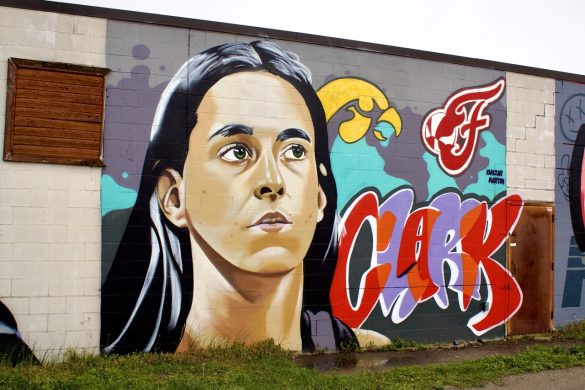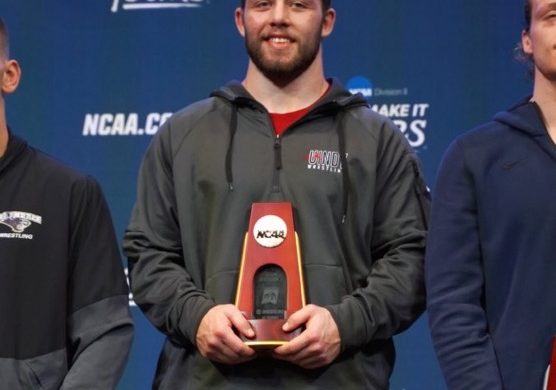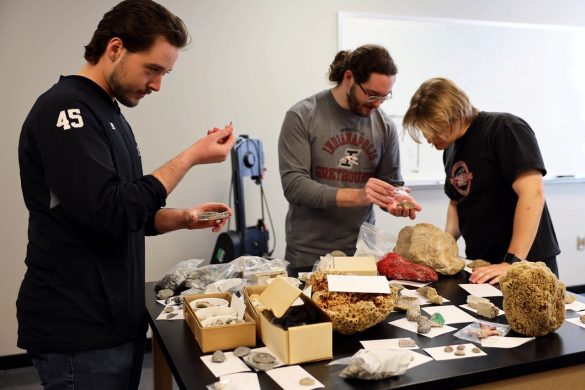
At 6 years old, Rolando Mendoza immigrated to the United States from Mexico to escape violence and lack of opportunities in their town. In the United States, Mendoza dreams of becoming an optometrist and owning his own practice and is committed to attend graduate school at Indiana University in Bloomington this fall. Photo by Mercadees Hempel
“I can remember some things—like the most vivid image I have is us being at our house and on the front porch. There was people saying goodbye and everything, and I knew we were going somewhere else, but I didn’t know where.”
Senior biology major Rolando Mendoza came to Indiana from his hometown in Mexico on June 9, 2002, when he was 6 years old. Mendoza said that he has lived in Indiana for the last 15 years. Mendoza said that he is from a small town in the southern part of Mexico, and he lived in a neighborhood in which his parents did not feel safe and did not see a lot of opportunities.
“Part of the reason [why we left] was that my grandfather was killed right in front of my house. So it was kind of a violent atmosphere to be in, and there were some drug cartels. It wasn’t as bad as other places,” Mendoza said. “It was still kind of dangerous to be there…. It was a really small town with 500 people, so there weren’t many opportunities.”
Mendoza said that there was only one elementary school, one high school and one middle school, and his family had one of two phones in the town.
He said that out of all the people his family knew in the town, only two went to college, and most either ended up working on the farm or in the fields. So, the undeveloped area, combined with the crime, convinced Mendoza’s parents to move to Indiana, where they already had family living undocumented.
Mendoza said that his parents did not qualify for a visa because they did not meet certain requirements. Therefore, they decided they had to migrate into the United States illegally.
He said he and his family had to ride the bus to the border, where they would meet a guide who would lead them across. Mendoza said it took a few tries to get across because the guide his family agreed to meet with did not show at first. They then switched guides and began the journey.
Mendoza said that the walk across the border takes four to six hours, and if they had been caught, they would have been sent back.
He said, that on the walk, he saw bags and other things people would leave behind, and they often heard stories about people being kidnapped or killed. Eventually, Mendoza and his family were picked up and taken to the United States where they lived with some relatives and began attending school.
Mendoza has lived in the United States ever since. Mendoza is under Deferred Action for Childhood Arrivals, an immigration policy that allows certain undocumented immigrants who came to the United States when they were young to obtain a renewable two-year period of deferred action from deportation and eligibility for a work permit.
He said he does have some peace of mind, and things such as getting a driver’s license and applying for jobs became easier when he was able to get a Social Security number. However, there is still fear.
“[There’s] the fear of losing everything, because I’ve been here since I was 6, and I’m 21 now,” Mendoza said. “So it’ll be 15 years in June, and in all that time, I feel like I’ve invested so much time in myself and in my community, and it could really just end whenever the government decides. Knowing that makes me work harder and motivates me to keep going. But I feel like for a lot of people, it kills their motivation, and they just think it’s not worth it.”
Mendoza dreams of being an optometrist and having his own practice, a dream that began in middle school. He also has done a lot of community work since high school and is helping recruit more Latino students at the University of Indianapolis, to help uphold UIndy’s diversity values.
Mendoza said that he likes to be involved with this type of work, and that if there was a direct path to citizenship, he would have done it by now.
To become a U.S. citizen with full citizenship rights, one can go through the process of naturalization. The most common way, according to legalzoom.com, is to “obtain legal permanent resident status by residing in the country” for five years, which is used by people who have an immigration visa.
A person can also marry a permanent resident and become a citizen or be sponsored by a company. Someone going through the naturalization process must also have good character, be at least 18 years old, have basic reading and writing skills and understand U.S. government and history. However, Mendoza said he does not have a visa, so he cannot go through this process.
“There’s not a direct opportunity for me to apply for citizenship or anything like that,” Mendoza said. “I don’t think it would be ethical for me to marry someone to become a U.S. citizen regarding where I’m at. And as for my career, I couldn’t get sponsored by a company because I don’t have certain skills for whatever the need may be.”
Mendoza said that while DACA has helped some things become easier, he wishes the government would make a direct path or way to become a legal citizen. He also said that many would take the path to become legal if it meant being able to stay in the place they consider home.
“It’s not that we don’t want to follow the law,” Mendoza said. “It’s just that it is very difficult to follow certain parts of the law when you don’t have proper documentation.”
Mendoza said that he is going to attend graduate school at Indiana University in Bloomington next fall, and this process has been frustrating.
He does not qualify for any federal loans or grants, and any loans he gets approved for will have higher interest rates than most other students.
“It’s frustrating just because I’m on the edge of things, and I have to live off hope and hope that things work out,” he said.
Mendoza said he is always willing to share his story with others, and he hopes that it will lead to people being more open-minded about immigrants. He said that even though he could lose everything he has worked for in one day, he is not giving up.
“I’ve always felt that diversity is the best way to get things done,” he said. “The more ideas you have, the more efficient you can be. So I think that’s made America thrive over the centuries, because if you work hard, you’ll have the opportunity to put your ideas to work.”
Mendoza said that he feels America has always been accepting, and he is happy to have a chance at achieving the American Dream.
“I went back to my home country for the first time in 14 years this summer, and honestly, the only thing that changed in terms of technology was there was like two Wi-Fi bars,” he said. “It was still the same whereas over here, in the last 14 years, there’s been so many changes in the city. And I just feel like me wanting to work hard and become better and make something of myself makes me American.”








